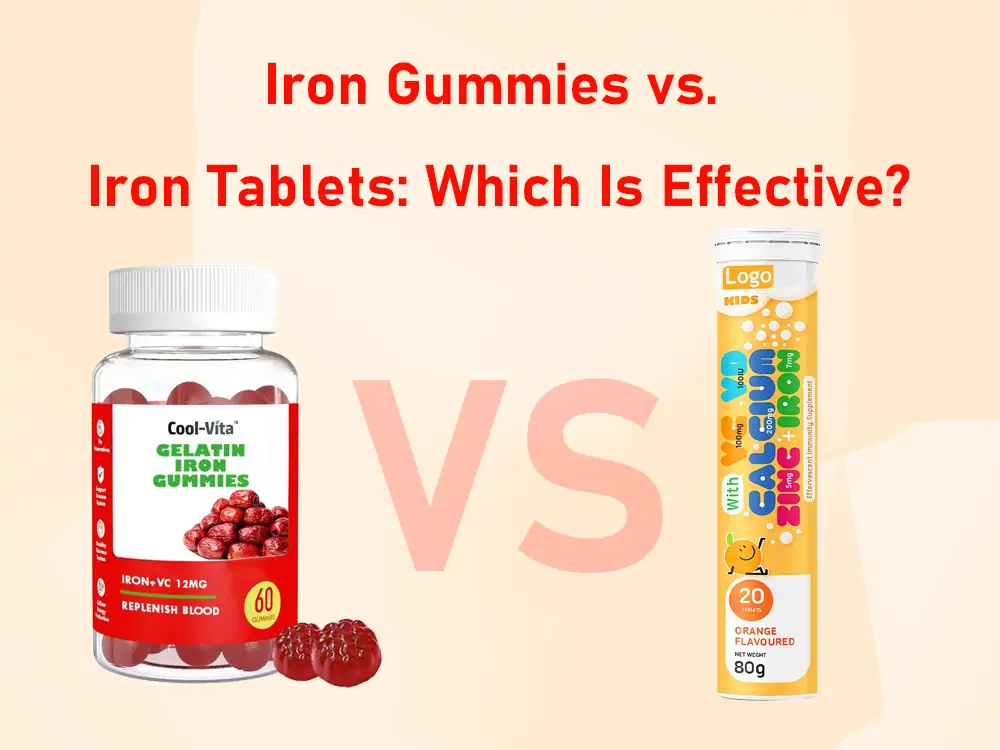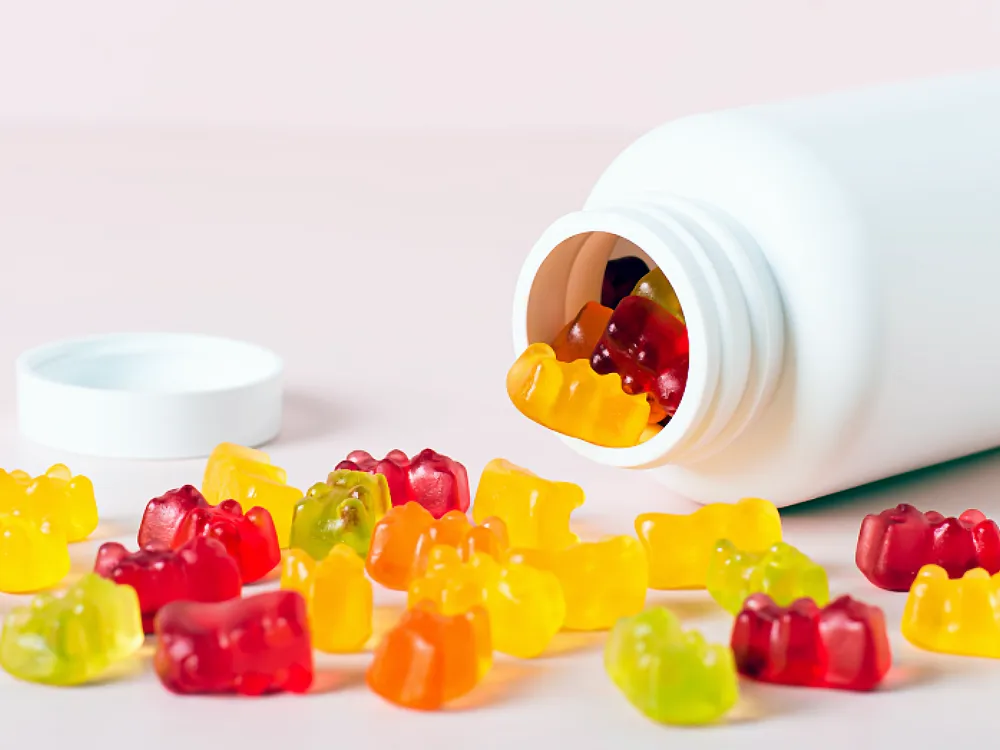
Iron is necessary for a healthy brain and body!
This important mineral helps create hemoglobin, a vital protein in red blood cells. This protein transports oxygen throughout your system, supporting healthy energy levels, cognitive function, and overall wellness.
Low levels of this iron affect many people—reporting approximately 2.5 billion cases, or 25% of the world’s population—leading to low energy, decreased immune response, and reduced mental clarity.
Iron supplements have been a necessity to combat this issue.
Note that not all supplements work the same. So, which form of supplementation should you opt for to boost your iron levels—chewable gummies or traditional tablets?
First, it’s not always just about your choice! Sometimes, it’s a matter of the right dosage, absorption rate, chemical formation, and most of all, EFFECTIVENESS! Now, let us deep-dive and give you the insights necessary to make a good decision.
How Iron Gummies Work?
Iron gummies deliver iron in a chewable form. They come as ferrous fumarate or ferrous gluconate, forms of iron that are easier to digest and absorb.
These supplements combine effective iron delivery with better tolerance. Studies show good absorption rates in most users.
The chewing process begins iron absorption quickly. Your saliva breaks down the gummy, making the iron more available. Most brands add vitamin C, which helps your body absorb up to 30% more iron.
Iron enters the bloodstream through the small intestine and is then used by the body to make hemoglobin. It helps prevent anemia and keeps iron levels healthy. It also supports brain functions, maintains energy, and supports immunity.
Benefits of Iron Gummies
Following are some of the benefits of Iron gummies:
- Taste and Texture: These supplements have a sweet taste. Their chewable and candy-like form helps people stick to their daily iron routine better than standard pills.
- Better Absorption: Most iron gummies contain vitamin C. It helps your body absorb iron more effectively.
- Gentle Digestion: The soft gelatin base means less stomach upset than regular iron pills, making them easier for most people to handle.
- Nutrients Working Together: These products often include supporting nutrients like B vitamins, folic acid, and zinc to enhance overall wellness.
- Convenient Form: Their dissolving format means you don’t need water, making them practical for busy schedules or those struggling with regular pills.
Who can take Iron Gummies?

Iron gummies are ideal for children over 4, pregnant women who struggle with regular pills, and people who have trouble swallowing tablets. While they help vegetarians and athletes needing iron support, they’re not suitable for young children, people with iron disorders, or diabetes. Check with your doctor first since the sugar content and lower iron dose may not meet everyone’s needs.
What Are Iron Tablets?
Iron tablets are highly concentrated supplements commonly used as dietary supplements to elevate iron levels in people with iron deficiency. Various types of iron tablets contain different iron compounds. Ferrous sulfate is one of the most prescribed ones. Each type of iron tablet contains different amounts of usable iron.
Iron tablets serve best in managing iron deficiency anemia. These supplements typically combine iron with helpful nutrients like folic acid and vitamin C to help your body absorb iron better. Doctors prescribe them for people with the following:
- low hemoglobin
- pregnant women
- those with heavy periods
- patients recovering from blood loss or surgery
These iron pills contain high iron doses, which is the active component. Iron helps lower symptoms of deficiency, such as low energy, pale skin, fatigue, and weakness.
Benefits of Iron Pills

- High concentration: Iron pills deliver powerful iron doses to treat deficiency. A standard ferrous sulfate tablet contains 65mg of pure iron, which helps patients recover quickly from low iron levels.
- Dosing options: Iron pills come in many different strengths – from 25mg up to 325mg. Since each pill has the same amount of iron, you get consistent treatment for iron deficiency.
- Longer shelf life: The iron tablets maintain their potency during lengthy storage. The coating guards the internal iron from damage. Proper storage ensures most pills remain effective for up to three years.
- Cost-effective: You can buy iron pills at lower rates than other iron supplement products. Most pharmacies sell them at reasonable prices. Patients find it simpler to continue their required treatment over time.
- Fast results: People generally recover from iron deficiency symptoms in just two or three weeks of taking these supplements. Your tiredness and weakness will recover faster with these supplements than with any others. Research backs up these quick results.
- Fewer ingredients: Each pill only contains essential iron, a binding agent, and an outer layer. A small number of components lowers the risk of side effects. The treatment benefits people who must follow specific dietary guidelines.
Which is More Effective, Gummies or Iron Tablets?
You will choose wisely when you understand what happens to iron supplements after swallowing. After taking the iron tablet it enters our stomach where gastric acid breaks it up. The pill breaks down in your stomach acid to send around 65mg of iron to your small intestine. Unlike iron gummies, you swallow with ease their iron content (10–15 mg) starts breaking down in your mouth and delivers less iron than the full dose found in regular iron tablets (65 mg).
Iron supplements exist in multiple forms, yet they behave differently during absorption. Basic tablets provide better prices and higher levels of iron per administration. These fast-dissolved tablets can strain your digestive system and create stomach issues for certain individuals. Gummy supplements offer a smoother experience because they include vitamin C, which helps your body absorb iron yet requires greater amounts to deliver equivalent benefits.
Absorption depends on several factors. You should take iron tablets without other foods along with vitamin C for best results. Your body cannot properly absorb iron supplements when consuming tea, coffee, milk, and fiber-rich foods. Gummies provide better flexibility in taking time because they contain substances that help your body absorb iron faster.
Your body’s requirements should dictate your choice between tablets and gummies. First, find a doctor to learn which iron supplement and dosage match your health profile and iron status.
Which has Fewer Side Effects?
Your body reacts differently to iron tablets than to iron gummies. Traditional iron tablets help improve iron levels but frequently lead to digestive problems.
Common problems include:
- constipation
- nausea
- stomach pain
- black stools
- a metallic taste
High iron levels in the tablets directly touch the stomach lining, which leads to these side effects.
Gummies create a more comfortable digestive experience than other iron supplements. Gummy supplements use ingredients that target digestive problems and contain less iron to help prevent constipation. Many patients handle these supplements more comfortably because they taste better and experience fewer digestive issues. You absorb lower amounts of iron when you use this softer option.
To minimize side effects with tablets, try these tips:
- Begin by taking the smallest recommended amount and enhancing it slowly over time.
- Taking these supplements with food should calm stomach problems but will slow how much iron your body gets.
- Breaking your iron supplements into multiple doses throughout the day plus drinking water will ease side effects better.
- Take your tablets or iron gummies away from meals, and steer clear of coffee and tea when consuming them.
Gummies deliver iron in smaller amounts even though they feel better to swallow than tablets. Your decision between the options depends on your iron requirements and how you handle side effects.
Dosage and Efficacy
Daily iron needs vary significantly among different groups. The following table shows general daily requirements:
Daily Iron Requirements & Supplement Comparison
| Group | Daily Requirement | Iron Tablets (65mg) | Iron Gummies (15mg) |
| Adult Men | 8mg | 1 tablet | 1 gummy |
| Adult Women | 18mg | 1 tablet | 2 gummies |
| Pregnant Women | 27mg | 1 tablet | 2-3 gummies |
| Iron Deficient | 65-200mg | 1-3 tablets | 4-13 gummies* |
| Teens (14-18) | 15mg | 1 tablet | 1-2 gummies |
| Children (9-13) | 8mg | ½ tablet | 1 gummy |
*Not recommended to take this many gummies; tablets are preferred for iron deficiency
Doctors prescribe 65mg of iron tablets because this high concentration effectively treats low iron levels. The number of tablets you should take each day depends on your medical condition, with your doctor recommending one to three tablets that can be split at different times for better absorption. The high doses of iron pills help you recover from iron deficiency sooner.
Each iron gummy contains a reduced amount of iron, with doses between 10 and 15mg. You need to eat several gummies to get the same amount of iron from tablets.
Gummies have a convenience advantage, yet they can put users at risk of insufficient iron intake when dealing with major iron deficiency. Gummies take more time to bring iron levels back to normal.
Conclusion
Your choice between iron gummies and tablets depends on what works best for your needs.
People of all ages find taking iron gummies to be more pleasing and easy than iron tablets. Gummies function optimally as general supplements while helping people with light iron deficiencies. The small 10-15mg dosage of these options works well for users seeking long-term supplementation or alternative options to pills.
Iron tables offer stronger doses for quicker treatment benefits through an affordable iron resource. When severe iron problems require quick results, traditional tablets give you the right 65mg dose, which is proven to be effective at absorption.
Your body’s response to supplements, plus your iron requirements, will guide you to the best supplemental option. Your healthcare provider will help you select the proper treatment based on your health needs.
Frequently Asked Questions
1. Which form of iron supplement is better for children: gummies or tablets?
Iron gummies would be a better supplement for children. They taste good, are enjoyable, and are gentler on the stomach. While they deliver lower iron content, there isn’t a risk of overdosing. However, for severe deficiency, doctors may prescribe specially formulated tablets for children.
2. Do iron gummies contain other nutrients, such as vitamins?
Yes! Iron gummies bring multiple nutrients to your diet, including Vitamin C, Vitamin B, folic acid, and zinc. The extra vitamins and minerals in gummies support your entire body while helping your system absorb more iron. Gummies provide total nutrition because they contain this full blend of indispensable nutrients.
3. Can I switch from iron tablets to gummies or vice versa?
Yes, you can switch between forms, but consult your doctor first. Since tablets contain substantially more iron (65mg compared to 15mg in gummies), your healthcare provider needs to adjust the dosage accordingly. Your current iron levels and specific health needs will influence this transition.
4. How long does it take to see results from taking iron gummies?
The time needed to experience results from iron gummies varies from person to person. Iron gummies typically take 2-4 weeks before users notice increased energy levels. More significant improvements in blood iron levels appear within 4-8 weeks, while complete restoration may take 3-6 months. Tablets often show faster results due to their higher iron concentration.
5. What are the differences in absorption between iron gummies and iron tablets?
Absorption differences include:
- Tablets: 10-15% absorption rate, best on an empty stomach
- Gummies: 15-20% absorption rate, can be taken with food
- Gummies often include vitamin C for better absorption
- Tablets may need separate vitamin C supplement
